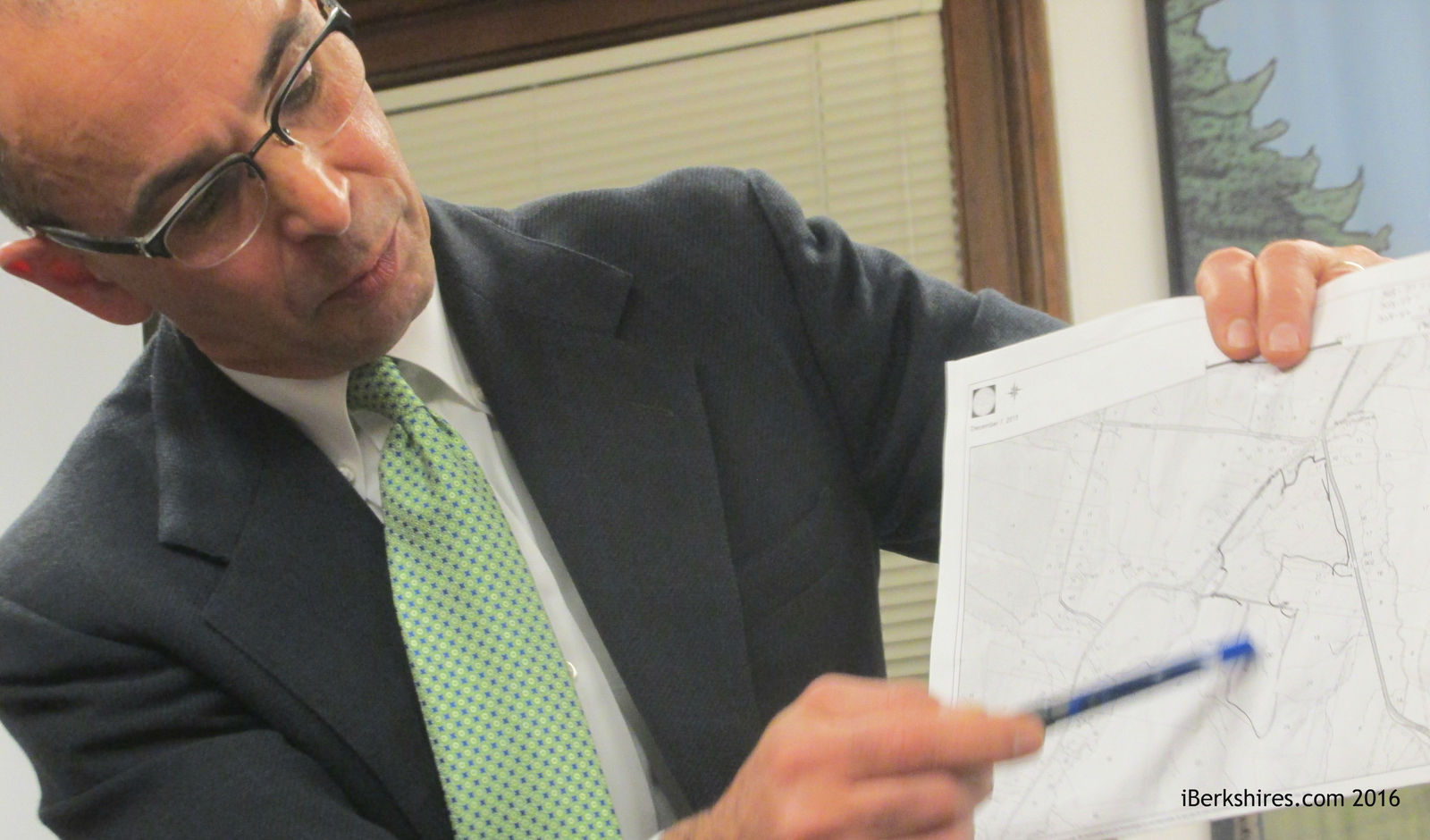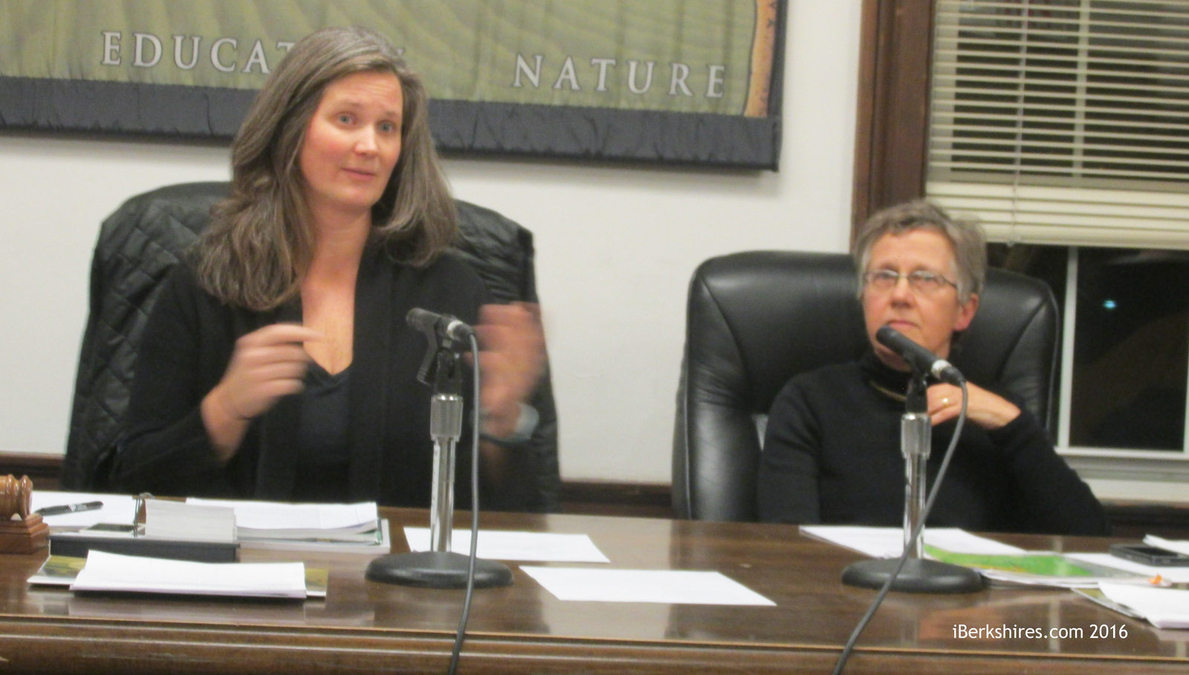WILLIAMSTOWN, Mass. — Five meetings into the Planning Board's deliberations on a proposal for a zoning change in South Williamstown, the issues remain the same and frustration is starting to show.
The owner of Waubeeka Golf Links was back before the panel Tuesday to discuss a proposed overlay district that would allow him to partner with a developer to build a hotel on his property.
But just as in meetings past, some Planning Board members and residents speaking from the floor said they want Mike Deep to identify a potential partner and come to the board with specific drawings before they will accept the idea of a zoning change.
"I think we would all be in a better position if we did ask the applicant to do a little more homework," board member Ann McCallum said.
"I want to point out that the college is doing exactly the same thing. ... They have come to us exactly the same way to ask that we expand the Village Business District to include a hotel. In order to win us over, they have spent tens of thousands of dollars on architects and engineers to bring us proposals we can look at."
At that point, McCallum's colleague, D. Chris Winters, interrupted.
"So that's what it takes to do business in Williamstown? A $2 billion endowment?" Winters asked.
That elicited grumbling from the back of the Selectmen's Meeting Room, to which Winters replied, "That's not a fair comparison. Don't make the comparison."
Deep's attorney, Stanley Parese, made the same point at the board's
October meeting, the second in a series that began on Sept. 1.
Parese again on Tuesday tried to explain the reason why it is unrealistic to expect developers to look at the golf course property before there is a regulatory path to creating a project in place.
"On the point about the college's approach to things, the resources are obviously spectacular," Parese said. "The other thing that is different is the college can't go anywhere with its money. The college is stuck right here. There are [private] developers out there with the kind of resources to do this development, but it's a big world.
"I would define 'really difficult' as asking someone to spend a ton of money before you know if you're able to even ask the question. I don't know how you think you sit down with someone with these kinds of resources and say, 'Come spend a couple hundred [thousand], and maybe we'll stand behind you at town meeting."
Any change to the town's zoning that would allow Deep to build a hotel at Waubeeka would require a two-thirds vote of town meeting.
Deep came to the town this summer to ask if such a change could be made so he can look for a partner to create a resort at the failing golf course. He and Parese have repeatedly told the Planning Board that the golf course-only business model is a losing proposition. And if Waubeeka closes its doors, the next likely step is to sell the property to a developer who could build a large residential development — by right according to the land's current zoning.
According to a draft bylaw to create the overlay district, 80 percent of the 200-acre Waubeeka property (actually three different tax parcels) would be kept as open space; under the land's current designation as Rural Residence-2, a residential development could build on up to 50 percent of the land.
The draft bylaw itself was roundly criticized by residents who spoke from the floor at Tuesday's meeting. At points, residents indicated they thought the members of the Planning Board and Town Planner Andrew Groff, who serves the board, are not capable of drafting a bylaw amendment.
Former Planning Board member and South Williamstown resident Patrick Dunlavey described the draft bylaw as "not ready for prime time." Selectman Andrew Hogeland, another South Williamstown resident, described the draft as "a doomed effort" in its current form and recommended the board do more "homework."
Hogeland said the current draft could not enforce the preservation of open space on the Waubeeka site. The draft presented read, in part, "At least 80 percent of the district shall remain in an open and natural state, inclusive of golf course areas, and be restricted from development in a manner enforceable by the Town."
"There's a zoning enforcement mechanism," said Parese, an attorney with more than 20 years of experience in real estate transactions and a former town moderator. "If the entire zoning bylaw wasn't enforceable, we may as well throw it out the window. If the zoning bylaw wasn't enforceable, it would have no function. It's enforceable, and it's been enforceable for the last 60 years."
Waubeeka abutter Sherwood Guernsey spoke several times to criticize the draft, which he described as "poorly written," and recommend it include a permanent conservation restriction on the Waubeeka property.
"A permanent conservation restriction is a non-starter because the hotel is not going to be able to guarantee [the golf course] will stay in business forever," Parese said.
"I would never advise him to put a conservation restriction on this property because if the hotel goes out of business, he's not going to give away the property. If that's not good enough, I guess it's not good enough, but I'd allow two-thirds of the town at town meeting to make that decision."
Later, Parese returned to the topic, noting that the 200 acres at the junction of Routes 7 and 43 is too valuable for Deep to tie up in a permanent conservation restriction that could potentially outlive the golf course and any resort that might be built there.
"The Idlewild [Hotel] is gone, the Greylock Hotel is gone, the resort at Sand Springs is gone," Parese said, referring to three historic Williamstown properties. "They all seemed like a great idea at the time. Time passes by and they're a memory. The [Cable] Mills we're reusing, if you asked someone in 1850 if it would be luxury apartments someday, first of all, they wouldn't know what a luxury apartment was, but they would have looked at you like you're crazy."
Eventually, the Planning Board drilled down into the particulars of the draft bylaw, though not until after McCallum asked if there was "any point" in doing so.
To date, just two members of the five-person Planning Board, Winters and Chairwoman Amy Jeschawitz, have argued in favor of bringing it to town meeting. The board's newest member, Sarah Gardner, has not expressed an opinion one way or the other but actively tried to use Tuesday's meeting to refine the document. Elizabeth McGowan returned to the argument that the Planning Board needs to look at the economic viability of the proposal.
"We realize, especially this time of year, it's difficult to have room occupancy," McGowan said. "I think we need to be fully aware of what goes on economically in Williamstown ... as Planning Board members."
Concerns over economic viability were first raised by McCallum at the board's
December meeting, at which she said her research found that hotels are "really, really, really hard" to operate successfully.
Jonathan Butler of the Berkshire Chamber of Commerce, who has been following the Williamstown debate, asked Jeschawitz for a chance to address the Planning Board on Tuesday.
Butler told the board that while the county has seen an increase in the number of rooms available, the majority of those are in South County, and that fact is juxtaposed against recent and coming expansions at two of North County's main tourist draws: the Clark Art Institute and Mass MoCA.
"With regard to the project at Waubeeka, we've learned in the region that golf courses and ski areas gain from pairings with lodging," Butler said. "We hope the Planning Board will give due consideration to allowing the Waubeeka overlay to go forward in your local process."
The Planning Board agreed at the end of a 3 1/2 hour meeting to continue refining the language in the draft bylaw amendment and discuss it again at a special meeting on Tuesday, Jan. 26.



